Why It’s Different This Time
In the comments to this post about the “Only Exit Strategy” for Israel in Lebannon Anderson posted a link to Kevin Drum wondering why Israel can destroy Hezbollah this time. Kevin writes,
HEZBOLLAH AND THE IDF….OK, genuine question here. Hawkish commentators have been filling the airwaves and printwaves with declarations that the war in Lebanon can’t end until Israel destroys Hezbollah once and for all. But putting aside for now the question of whether that’s good policy — a world without Hezbollah sure seems like a good idea — what makes anyone think Israel can accomplish this? The IDF spent nearly two decades in Lebanon until Ehud Barak withdrew in 2000, and presumably was doing its very best during that time to destroy Hezbollah. But they weren’t able to do it. So what’s changed since then to make us think that the IDF can do it now?
Good question, or that is what I thought. Now I’m not an expert in foreign affairs, the Middle East, terrorism, etc. But, Daniel Drezner has posted something from Stratfor that looks interesting,
The Israeli strategy appears to be designed to do two things. First, the Israelis are trying to prevent any supplies from entering Lebanon, including reinforcements. That is why they are attacking all coastal maritime facilities. Second, they are degrading the roads in Lebanon. That will keep reinforcements from reaching Hezbollah fighters engaged in the south. As important, it will prevent the withdrawal and redeployment of heavy equipment deployed by Hezbollah in the south, particularly their rockets, missiles and launchers. The Israelis are preparing the battlefield to prevent a Hezbollah retreat or maneuver.
Hezbollah’s strategy has been imposed on it. It seems committed to standing and fighting. The rate of fire they are maintaining into Israel is clearly based on an expectation that Israel will be attacking. The rocketry guarantees the Israelis will attack. Hezbollah has been reported to have anti-tank and anti-air weapons. The Israelis will use airmobile tactics to surround and isolate Hezbollah concentrations, but in the end, they will have to go in, engage and defeat Hezbollah tactically. Hezbollah obviously knows this, but there is no sign of disintegration on its part. At the very least, Hezbollah is projecting an appetite for combat. Sources in Beirut, who have been reliable to this point, say Hezbollah has weapons that have not yet been seen, such as anti-aircraft missiles, and that these will be used shortly. Whatever the truth of this, Hezbollah does not seem to think its situation is hopeless.
It seems that Hezbollah is going to stand and fight, and Israel is also trying to cut Hezbollah off from possible retreat. I don’t know if this was what Israel did when it previously occupied Southern Lebannon, but this at least sounds like it has the potential to seriously damage Hezbollah (provided that Hezbollah isn’t up to the task of taking on the IDF). However, later we get this,
The problem is this: While Syria does not want to get hit and will not make overt moves, so long as the Syrians cannot guarantee supplies will not reach Hezbollah or that Hezbollah won’t be given sanctuary in Syria, Israel cannot complete its mission of shattering Hezbollah and withdrawing. They could be drawn into an Iraq-like situation that they absolutely don’t want. Israel is torn. On the one hand, it wants to crush Hezbollah, and that requires total isolation. On the other hand, it does not want the Syrian regime to fall. What comes after would be much worse from Israel’s point of view.
This is the inherent problem built into Israel’s strategy, and what gives Hezbollah some hope. If Israel does not attack Syria, Hezbollah could well survive Israel’s attack by moving across the border. No matter how many roads are destroyed, Israel won’t be able to prevent major Hezbollah formations moving across the border. If they do attack Syria and crush al Assad’s government, Hezbollah could come out of this stronger than ever.
Basically, this idea of destroying Hezbollah seems doomed to failure since it seems unlikely that Israel will be able to fully cut of Hezbollah from retreating back into Syria. And if Israel attack Syria, what would prevent Hezbollah from letting the Syrian forces take the brunt of the fighting leaving Hezbollah in a strong position in Syria? As I noted, I have no expertise in this area and can’t say if this analysis from Stratfor is accurate, but it sounds like solid analysis and reasoning.

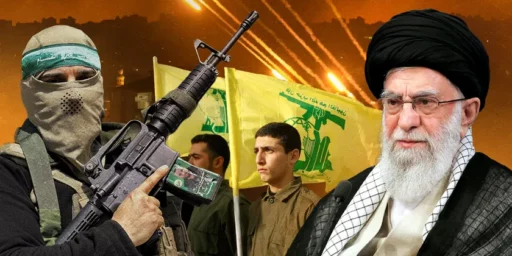
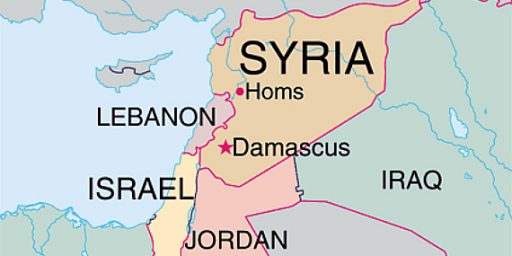
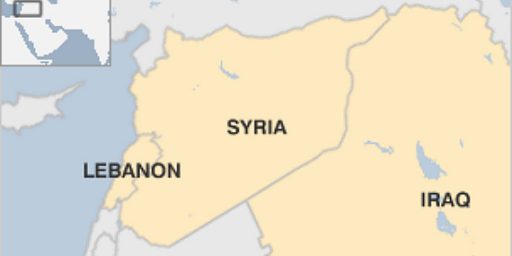
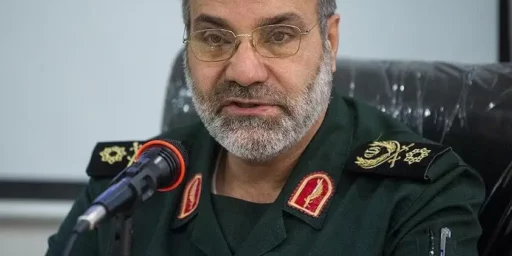
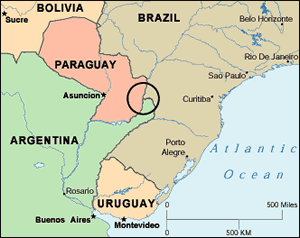
What’s different about this than Israel’s previous incursion into Lebanon? I’ll propose a few things. First, the lethality and precision of the weaponry is different. That means that Israel can destroy a lot of Hezbollah infrastructure without causing as much damage to civilians as might have been the case, say, a decade ago.
Note also that the Israelis are also cutting off the roads into Syria.
Additionally, the Israelis’ motivation is different and that’s changed just in the eight days since this exchange of hostilities began. When Hezbollah started using rockets capable of striking Haifa and began bringing up rockets capable of hitting Tel Aviv that meant that the stakes were much, much higher for Israel than they’d been at the start of the exchange and significantly higher than they were ten years ago. Existential threat as opposed to incidental terrorist attack.
Finally, the prospect of a nuclear-armed Iran changes Israels options and motivations, too.
Thanks, Steve. It seems we both continue to be skeptical.
Dave’s attempts to distinguish the present attacks don’t persuade without some more support. I don’t think Israel kinda-sorta wanted to get rid of Hezbollah during the previous occupation, and I don’t see that “destroying infrastructure” is going to do a lot of good, though it will kill plenty of civilians.
Anyway, I’ll happily retract my skepticism when Hezbollah is exterminated or surrenders, particularly if there are one or two dozen civilians left alive in Beirut by that time.
Some are always the skeptic. Many have underestimated Israel and their military planning and execution of those plans. I believe that if it were necessary, Israel could go north and impose what ever government they wished upon Syria. If Iran is allowed to develop nuclear weapons, Israel will be forced to wipe Iran off the map. Those in the middle east know that those who live there only understand the power of force. Liberals can fool themselves into believing otherwise. But the idea the the elimination of Israel as a state will solve all Arab problems is just a lie. Remember, Hitler blamed the Jews for the plight of Germany post WWI. The results, for the most part were non nuclear but still devastating. Only a fool waits until his enemy gains strength before a fight.
I believe that if it were necessary, Israel could go north and impose what ever government they wished upon Syria.
Zelsdorf, that is a really, really dumb thing to say. Fantasy-world material.
Come on now. Tell us about this gov’t that Israel can impose on Syria. We’re all ears.
If Iran is allowed to develop nuclear weapons, Israel will be forced to wipe Iran off the map.
Preventive nuclear destruction of an entire nation (which I doubt Israel can achieve, though they could certainly do horrible things) because there’s a *chance* that nation might nuke you?
Not dumb like the above, just evil.
Wanna see propaganda?!?
http://www.rawstory.com/news/2006/GRAPHIC_Images_of_suffering_death_on_0719.html
Notice no comments allowed.
If anything, Hezbollah will get stronger when all is said and done. Look at Beirut. Israel is destroying it. They are creating a million more enemies. Hundreds of civilians are dead and those civilians have fathers, brothers, uncles, and other family. They may not have picked up a gun to fight before, but they will now.
How is that “propaganda,” Matt?
Too one-sided? Didn’t show enough dead Israelis?
Could that be because the Israelis tend to rack up a few more victims than casualties?
The deaths of women, children, and other civilians isn’t “propaganda.” It’s a fact of warfare, particularly the kind of aerial-bombing war that Israel has chosen.
People who say “let’s go to war” need to watch more videos like that.
Matt: While I don’t have the video clips (with their attendant propaganda scripts), I do link to photos that are making their way around the Middle East but which will never appear on American TV. Oh, and I have open comments.
I’m not interested in the talking points put out by the Syrian government or by Hezbollah (they’re responsible for about half the material in the video clips, btw).
I am interested in the fact that images of the dead—which are always highly emotive—are handled differently in the Islamic world than they are in the West or in Israel. This isn’t for political reasons so much a cultural reasons.
The sum effect is one of unfairness to the political arguments, but not necessarily to the matter of truth. A major truth is that people get really pissed off when they see dead children and they think angry thoughts about those who killed them. Angry thoughts often lead to violent actions.
However justified Israeli actions are now—and I believe them to be justified—the Israelis need to be careful in their targeting to avoid whatever accidental deaths they can. Overkill will lose them the limited support the Israeli government has in the Middle East for taking down Hezbollah. That would be unfortunate, to say the least.
Please, like Israel devastating the major Arab armies didn’t create resentment? People can resent all they want, but they still cannot defeat Israel. I don’t trust Hezbollah propaganda about civilian deaths, since they seem to have taken the Baghdad Bob route. Hezbollah is a part of the Lebanon government, and now they have their war.
Does it occur that all these Islamic nutbags blowing up and sending missiles that deliberately target civilians are creating more resentment that breeds more Western military recruits? I don’t care about terrorists or their supporters dying in a war they picked with Israel.
Please spare us the liberal tripe… you’re projecting your NYT mentality onto people who do not get that subscription.
Hezbollah killed two ARAB children in Nazareth yesterday. What did they do to deserve it?
Meanwhile, Hezbollah surrounds themselves with children. They forcibly prevent them from leaving. So what does Israel do? Say ‘oh well, keep lobbing the missles, we can’t retaliate because you use human shields and any collateral damage as propaganda’.
As for creating more enemies, that’s just plain ignorance of the world of terrorists. Israel attempted to appease their enemies, and we’re all seing how that one worked out. Similarly, we did not create Al Qaeda. We will finish it though.
I’d like to see what these new recruits will use for weaponry with theirs destroyed, and the trade routes from Syria cut off.
Kevin Drum’s e-correspondent writes to suggest that Israel’s goal isn’t to eradicate Hezbollah, but to knock ’em back to guerrillas rather than the unofficial army of Lebanon.
“I’m not quite sure how the bombing of Beirut figures into this, but what do I know?” Drum comments. Indeed.
I think the ideal for Israel is to reduce Hezbollah enough that the Lebanese army can be the biggest dog in the pack. Will they wipe out Hezbollah? No. Can they knock out their equipment and personnel enough to reduce their capabilities? Yes. Israel has never sought to wipe out any of its opponents in any of the many wars is has fought. What it has done is fight enough to knock back their opponents capabilities to attack Israel.
I suspect a fair amount of the delay in the ground war is precisely because of the Hezbollah capabilities. But as the Gulf war showed, round the clock bombing can wear down any army.
Who did you Plagiarize with this one ? Anderson ?
“As for creating more enemies, thatâ??s just plain ignorance of the world of terrorists. Israel attempted to appease their enemies, and weâ??re all seing how that one worked out. Similarly, we did not create Al Qaeda.”
You are correct…we did not create Al Qaeda, but our post War policy in the middle-east did create the conditions which allowed Al Qaeda. It was the placement of U.S. military in Saudi Arabia that helped foment bin Laden’s radicalism. Our war in Iraq, combined with the blind support of Israel, are creating more enemies than we will ever be able to kill. Our foreign policy is ignorant beyond belief, but hey…war is a profitable business, except for the people who get caught in the middle.